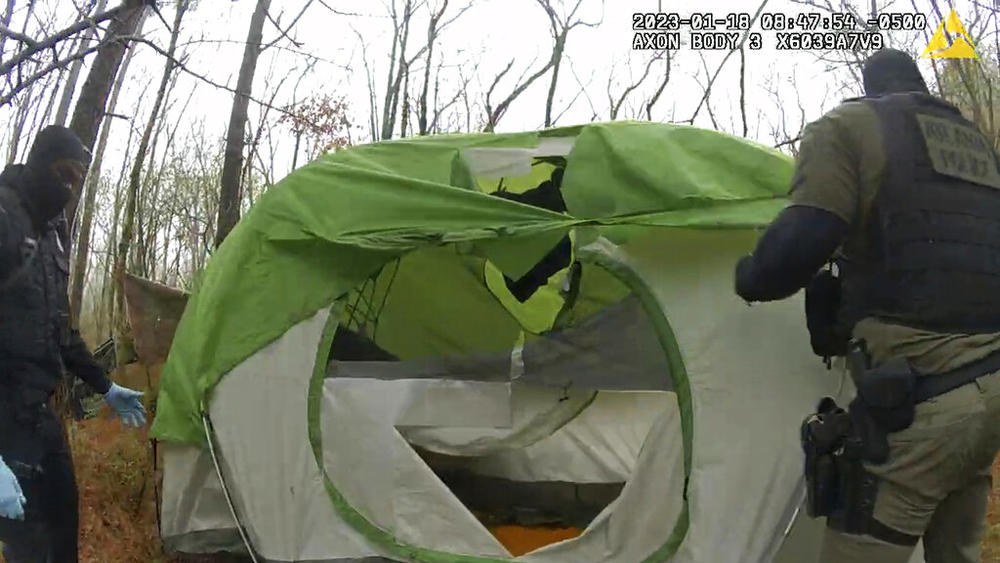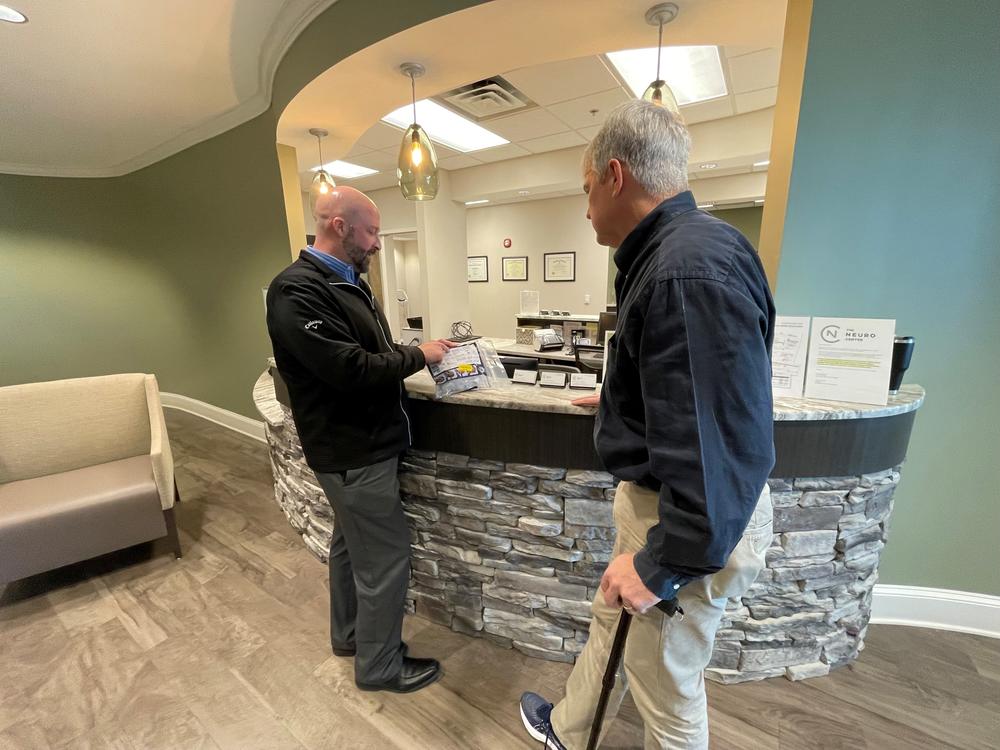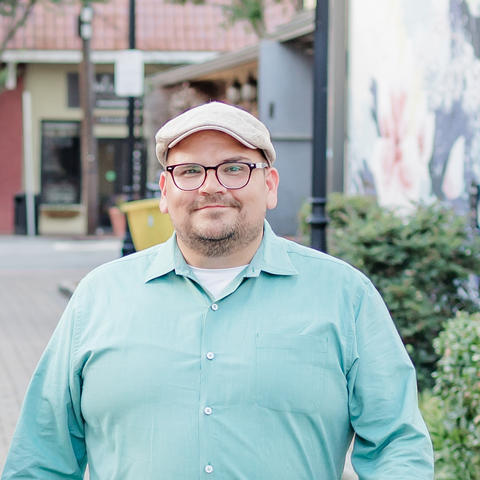
Section Branding
Header Content
Georgia Today: Prison warden arrested, VP Harris in Atlanta, financial boost for Midtown ATL park
Primary Content
On the Thursday Feb. 9th edition of Georgia Today: A Georgia prison warden has been arrested, VP Harris speaks in Atlanta, and a financial boost for a planned Midtown ATL park

Peter Biello: Welcome to the Georgia Today podcast from GPB News. Today is Thursday, Feb. 9. I'm Peter Biello. On today's episode, a Georgia prison warden has been arrested on conspiracy charges. The vice president talks climate change in Atlanta, and the planned Midtown Connector project gets a financial boost. These stories and more are coming up on this edition of Georgia Today.
Story 1
Peter Biello: A Georgia prison warden has been arrested on conspiracy charges and terminated from his job in connection to an ongoing murder investigation. GPB's Grant Blankenship has more.
Grant Blankenship: According to the Georgia Department of Corrections, Brian Dennis Adams was fired this week from his position as warden at Smith State Prison in Tattnall County. The termination followed Adams' arrest by the Georgia Bureau of Investigation for conspiracy to violate the Racketeer Influenced and Corrupt Organization, or RICO, Act, according to the GBI. The alleged conspiracy came to light while investigating the murder of 88-year-old Bobby Kicklighter in the nearby community of Glenville. It's believed the murder was organized from inside Smith's state prison by an inmate via a contraband cell phone. The alleged organizer was also charged under RICO smuggling. Cellphones into prisons is lucrative. That's one challenge for brand-new Georgia Department of Corrections Commissioner Tyrone Oliver, who says stopping cell phone use in prisons is a top priority for GPB News, I'm Grant Blankenship in Macon.

Story 2
Peter Biello: The Atlanta Police Department has released body cam footage from the site of last month's fatal shooting near the planned Public Safety Training Center. The Jan. 18 shooting resulted in the death of activist Manuel Teran and left an officer wounded. The videos do not show the incident. The Georgia Bureau of Investigation says officers directly involved were not wearing body cameras. The release comes two days after Teran's family called for more transparency from the GBI in its investigation.

Story 3
Peter Biello: Vice President Kamala Harris spoke in Atlanta yesterday about White House efforts to tackle climate issues. It's part of the Biden administration's efforts to boost awareness of its accomplishments. GPB's Stephen Fowler reports.
Stephen Fowler: From poor drinking water quality to electrifying school buses, the vice president touched on a number of climate related topics Americans face in a half hour discussion at Georgia Tech. UGA Professor Marshall Shepherd, who helped moderate the discussion, told the vice president the administration's investment in things like the Inflation Reduction Act and thinking about solutions to severe weather impacting communities was a big help.
Marshall Shepherd: This is not about polar bears. I like polar bears. They're cute. But this is about kitchen table issues, issues that affect lives in Oakland, California, in Canton, Georgia, and Nashville, Tennessee, .
Stephen Fowler: Georgia is one of several stops President Joe Biden and his cabinet are making this week after the State of the Union address touting the administration's last two years and looking ahead to the next two as Biden likely runs for reelection. For GPB News, I'm Stephen Fowler in Atlanta.
Story 4
Peter Biello:The city of Atlanta will receive more than $3 million in federal funding to help finance a project to connect East and West Midtown around the Georgia Tech campus. GPB's Amanda Andrews reports.
Amanda Andrews: The Midtown Connector Project has been in development for about four years. The plan would build 15 acres of greenspace over Highway 85 between North Avenue and Fifth Street. Plans include a playground, reflecting ponds, walking trails and an outdoor performance space. Taylor Morison is with the Midtown Connector Project Foundation. He says this park could help connect the city and make it more walkable.
Taylor Morison: We have great organizations like PATH, like the Path Foundation and in the BeltLine, in fact, that, you know, we envision in the future building off of this so that we can connect to the Upper West Side, lower West Side, south side where I live, east side, northeast side, you know, all around.
Amanda Andrews: Morison says groundbreaking could happen at the end of 2024, with the goal to open the park in 2028. For GPB News, I'm Amanda Andrews.

Story 5
Peter Biello: A national trucking research group says Atlanta has nine of the 100 most congested highway bottlenecks in the country. Two of those are in the top five. That's where Interstate 285 meets Interstate 85 North and Interstate 20 West. The American Transportation Research Institutes 2022 congestion report released yesterday found supply chain bottlenecks are worsening across the country. Average rush hour truck speeds were 36 miles per hour, down more than 6% from the year before.
Story 6
Peter Biello: A state Senate committee voted yesterday to approve a bill that would apply Georgia's racketeering law to dogfighting. Senate Bill 68 now moves to the full Senate. Applying the state's racketeering law would mean prison sentences of 5 to 20 years instead of the current 1 to 10 years. Supporters say dogfighting is often associated with other crimes and that the proposal also would allow prosecutors to indict more people. Opponents question why tougher laws needed when most offenses are already felonies and penalties get tougher with additional convictions.
Story 7
Peter Biello: Turkish-American and other Georgia-based organizations are sending help to those in need after Monday's earthquake in Turkey and Syria. Erhan Cevikel of the Turkish American Chamber of Commerce of the South says a Turkey-bound plane left Atlanta yesterday loaded with needed supplies, including blankets and toiletries.
Erhan Cevikel: It is not easy to reach everyone quickly in that region. The magnitude is unexperienced by any human.
Peter Biello: His group has set up two collection points for donations in metro Atlanta. Atlanta-based CARE and Brunswick-based Mapp International are among the larger Georgia based organizations also coordinating relief efforts.

Story 8
Peter Biello: A new test performed by just three neurologists in Georgia can help confirm a diagnosis of Parkinson's disease. GPB's Ellen Eldridge has more.
Ellen Eldridge: The Syn-One skin biopsy test looks for a specific protein that's only found in a handful of conditions. The results help doctors know if neurological symptoms are related to movement, dementia or a sleep disorder. Georgia patient Chris Griffin says the biopsy results brought him peace of mind and helped him make lifestyle changes and treat his Parkinson's early.
Chris Griffin: When I got the diagnosis, it was a relief. I mean, because now I could — I could name a demon. I could fight because I can name my demon. I could fight my demon.
Ellen Eldridge: Skin biopsies are available from neurologists in Gainesville, Alpharetta and Macon. For GPB News, I'm Ellen Eldridge.
Story 9
Peter Biello: It was known as the Alabama Industrial School for Negro Children, located in the Mount Meigs community of Montgomery, and was initially intended to be a place where troubled Black kids could go instead of prison with adults. It became, to many Black children, a place where nightmares played out in real life: beatings, sexual assaults, torture and death. It was less about reform than a new kind of slavery — one with echoes in 21st-century American life. What happened to those kids at Mount Meigs is the subject of a new podcast reported and hosted by Atlanta-based journalist Josie Duffy Rice. It's called Unreformed. And Rice joins me now. So tell us about how the idea for this podcast came to be.
Josie Duffy Rice: The idea from this podcast really came from Virginia Prescott in her new role at School of Humans.
Peter Biello: Virginia Prescott is a former host here at GPB and School of Humans is the production company behind Unreformed.
Josie Duffy Rice: And she reached out to me about two summers ago and said there is a story about a man named Lonnie Holley, a famous artist here in Atlanta, and a school he went to as a child. This was like kind of the post-George Floyd era: a time when if you cover criminal justice, you are getting a lot of emails about a lot of things. But this one immediately stood out to me. There was something about the story that I felt really tied to. And so that's how we basically spent the past year and a half looking into it.
Peter Biello: So this started with the story of Lonnie Holley. Can you tell us a little bit about who he is?
Josie Duffy Rice: Lonnie Holley is an artist originally from Alabama. He lives here in Georgia now. He's a self-taught artist and his work has been in the Metropolitan Museum, the National Gallery, the Smithsonian. It's here at the High [Museum of Art in Atlanta]. He's an incredible, incredible artist. But before he was an artist, he was an 11-year-old child who had been separated from his family, was living with virtual strangers and was out past curfew one night and was picked up by the police, sent to jail and then shipped off to Mt. Meigs, what was then known as the Alabama Industrial School for Negro Children. And what he endured there was abuse and harrowing conditions that have haunted him for the past 50 years. And so this is kind of our attempt to help tell that story.
Peter Biello: The story is about how the school essentially wasn't really about reform. The school for Black kids didn't have any teachers, really, whereas schools for white kids at that time were actual schools with actual funding and actual instruction.
Josie Duffy Rice: The difference between these kind of quote-unquote "juvenile reformatory" is the Black one was for free labor. It was basically a place where kids were sent out in the morning and told that when they got back, they better have 100 pounds of cotton in their sack. And this is the 1960s, not the 1860s. This was functionally a slave plantation. And we hear people call it a penal colony, a kiddie prison. All of those terms apply. The only term that doesn't apply is "school."
Peter Biello: And it sounds similar to places like the one described in Colson Whitehead's novel The Nickel Boys, the Dozier School in Florida, and also sounds similar to "schools" for Native Americans where hundreds of Native American children were killed.
Josie Duffy Rice: I think that what's really important about Mt. Meigs is a couple of things. One: its place, its literal geographic place — in the 1960s. This is Montgomery, Ala. This is Rosa Parks getting arrested on the bus, right? This is Martin Luther King marching through the state. This is George Wallace. And so in the midst of that, just miles away, are kids on a plantation being abused with no one to help them. And it's not just Mt. Meigs. It's not just the Dozier School. There is a recent one in Missouri called the Agape School there. There are places that exist then and now. And so we are uncovering this particular one and hopes that it will lead us to not only uncover more about Mt. Meigs, but uncover more about the other institutions like this which exist throughout the country.
Peter Biello: You've asked listeners to the podcast to reach out with their stories if they've been to Mt. Meigs or places like it. What have you heard from people reaching out to you?
Josie Duffy Rice: I've heard a variation of things. I've heard [from] a couple of people who said "I went there...And it's haunted me ever since." Those have come in the past couple of days. But we've also heard from people who they heard about it from their uncle or their dad or their grandfather. They always knew about this place called Mt. Meigs, but they never really knew what went on there because they didn't talk about it. And we've also, interestingly, heard from people who have worked there, who have been prosecutors who sent kids there, who have helped this infrastructure continue because remember, Mt. Meigs exists today.
Peter Biello: What's the state of Mt. Meigs today?
Josie Duffy Rice: The short answer is we don't really know. The state of Alabama, was not interested in having us on the Mt. Meigs campus, as you may not be shocked to hear. And it's a black box, basically. It's very difficult to get information about how it's operating. I want to be clear that I don't think Mt. Meigs today is what it was in the 1960s. I don't. That was a special kind of horror. But I also don't think it's great. I just talked to someone yesterday who was there six months ago and said it's a pretty dismal place. And so it really kind of exists in that middle ground between, "Well, we're not what we were, but we're certainly not a place that anybody would want their children to to be sent to."
Peter Biello: Has the state of Alabama ever owned up to what happened to the kids?
Josie Duffy Rice: They really haven't, other than being kind of court-mandated to own up to it in the late 1960s, in the sense that they challenged the court case they lost. And that was kind of the owning up that was done. But no, there has been no apology. There has been no acknowledgment. There's been no attempt to kind of reach out to the kids who went there. There's really been no attempt, it seems, to even maintain records of who went there. Many of these voices are just lost to time. And that's one of the things that I think haunts us.
Peter Biello: What do you hope listeners take away from this podcast?
Josie Duffy Rice: I think two things are really my focus. The first is I think it's important for us to witness, to bear witness to what these survivors are telling us. This is our history. It Is not that long ago. And we see right now such an effort to avoid learning about history, especially learning about Black history. And this is not just Black history. It's also white history. But the second thing I want people to take away — and this might sound incongruous given the topic — is I do think this is a hopeful story. I do think in a lot of ways it is a testament to human resilience, the capacity for people to change and the ability for people to be willing to speak about something like this even decades later. The bravery, the courage it takes is unmatched. And I come away from this podcast feeling not devastated by the human condition, but hopeful about it.
Peter Biello: Well, Josie Duffy Rice, thank you so much for speaking with me. I really appreciate it.
Josie Duffy Rice: Thank you so much for having me.
Peter Biello: And the team behind Unreformed is looking for more survivors of Mount Meigs and other institutions like it. You can find more information on how to get in touch with them at GPB.org.
Story 10
Peter Biello: An Augusta area food bank is celebrating a milestone this week. Golden Harvest Food Bank says in its 40 years, it now has served 300 million meals. That number includes the meals served at The Master's Table soup kitchen and the ones given out through their pantries and partner agencies. Golden Harvest Food Bank also says one in eight people in its 25 county service regions struggles with hunger, but they have a 10-year plan and goals for each year to make sure no one is without food.

Story 11
Peter Biello: And vegetarians take note. Chick-Fil-A is getting a new plant based option. The Atlanta chain announced today it's testing a breaded cauliflower sandwich at restaurants in Denver, Charleston, South Carolina, and the Greensboro, N.C., area. The test begins Feb. 13. Chick-Fil-A says it spent four years looking for the right veggie to launch, testing out mushrooms, chickpeas and chopped veggies before settling on cauliflower. Like Chick-Fil-A's signature chicken sandwich. The cauliflower steak is marinated, breaded, pressure cooked, and then served on a bun with two pickle slices. With this move, Chick-Fil-A joins the ranks of fast food restaurants, offering new options that come close to the taste of meat but is actually not. Witness the impossible whopper at Burger King and KFC's beyond meat Nuggets.
All right. That is it for today's edition of Georgia Today. If you haven't hit "Subscribe" on this podcast yet, do it now. That way, you'll stay current with all the top stories in the state. And if you've got feedback, send it our way. Email's best: Send it to GeorgiaToday@GPB.org and be sure to leave us a review on your favorite podcast platform.
I'm Peter Biello. Thank you so much for listening. We'll see you tomorrow.
——
GPB's Georgia Today newsletter hits your inbox on Tuesdays, Wednesdays and Thursdays with top stories from around the state featuring news, politics and more. Subscribe here



